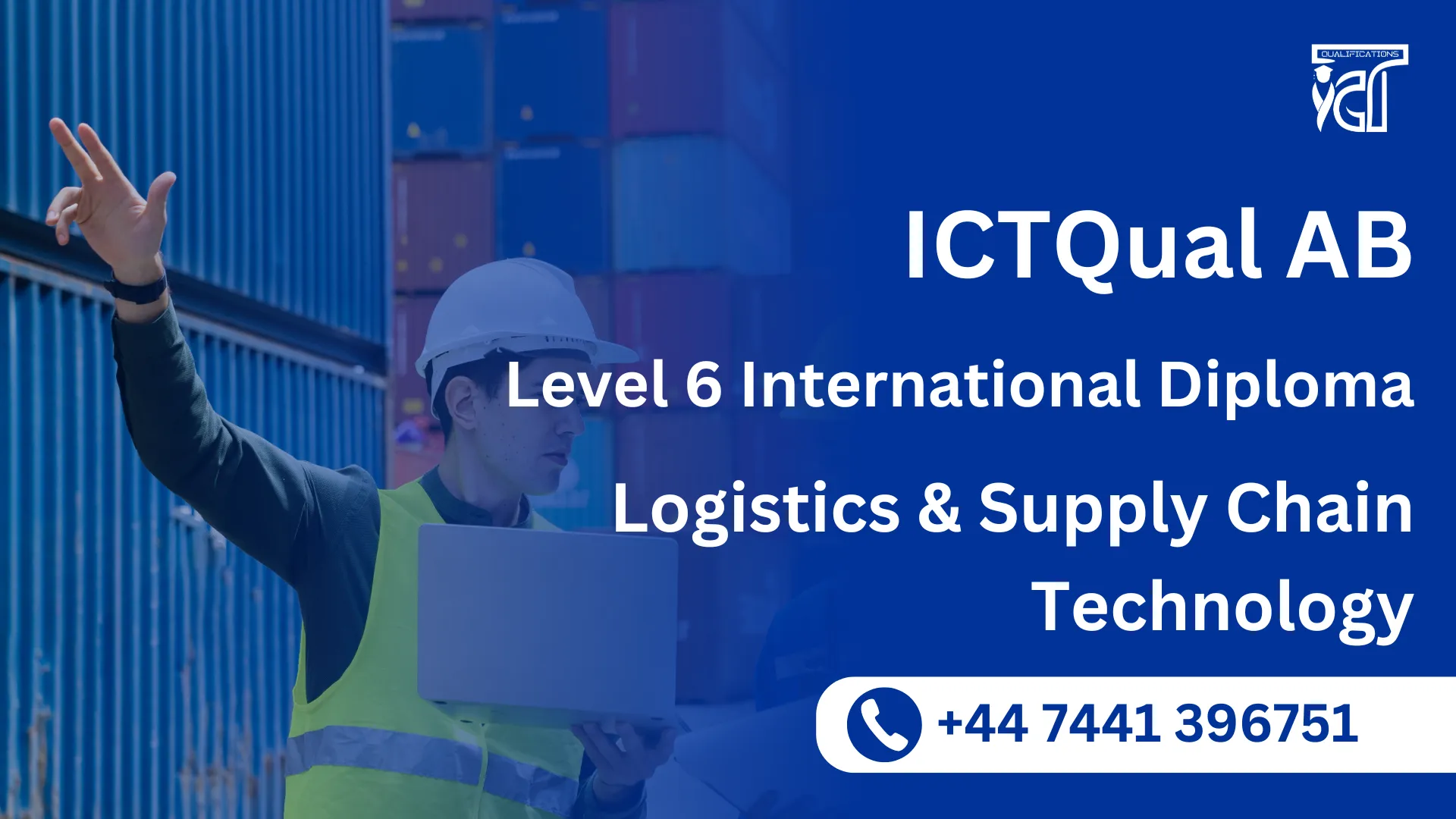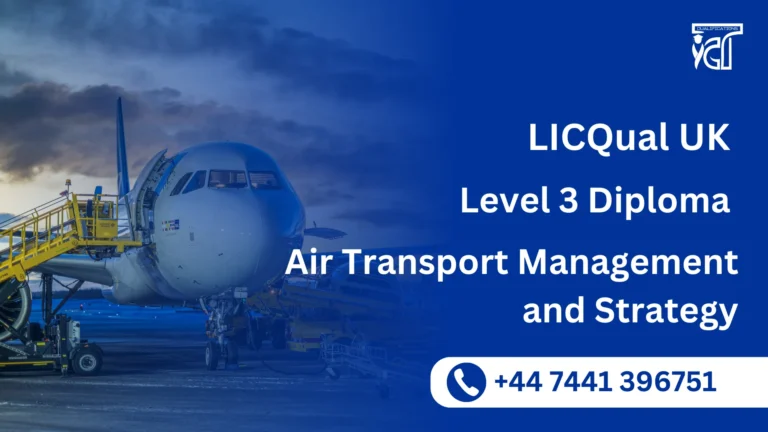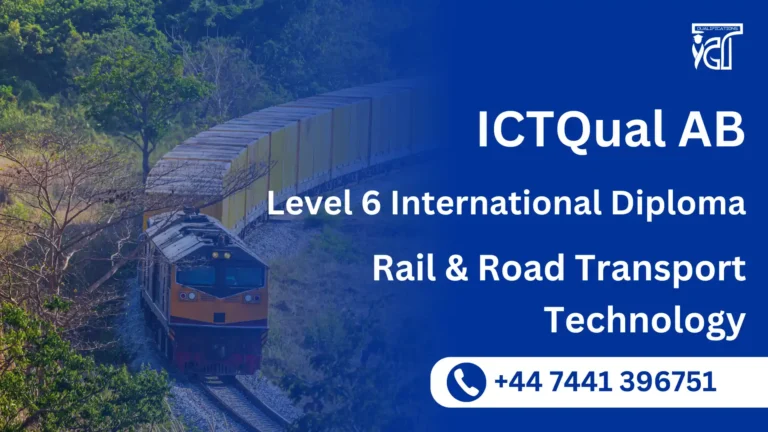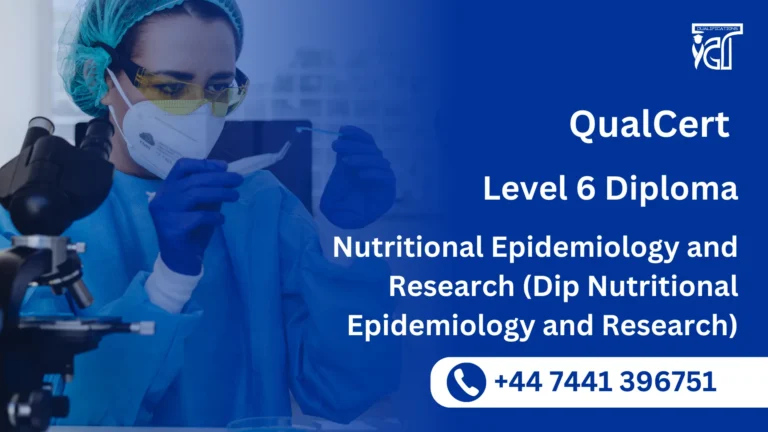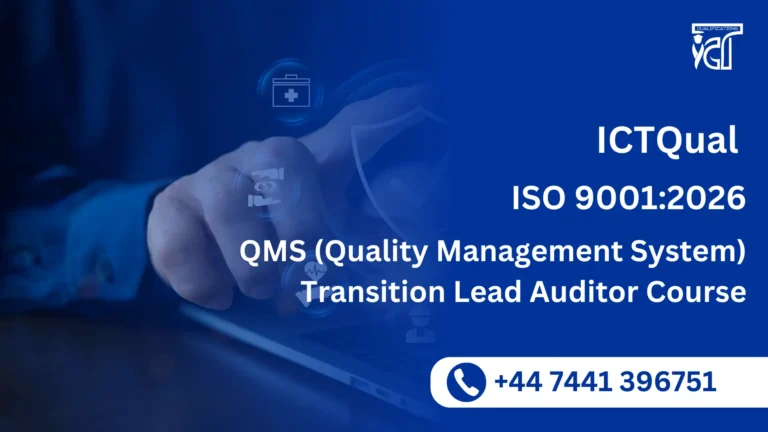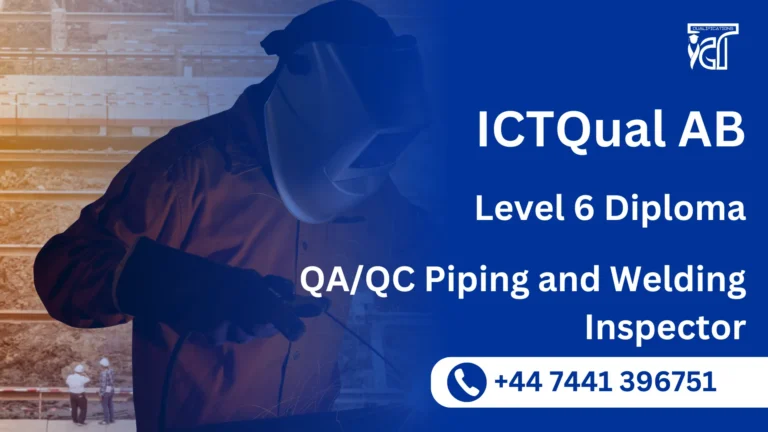The ICTQual AB Level 6 International Diploma in Logistics & Supply Chain Technology is a comprehensive programme designed for learners aspiring to excel in the global logistics and supply chain industry. Whether you are a fresher aiming to launch a career in supply chain management or a professional seeking to advance into leadership and strategic roles, this diploma equips learners with the knowledge, technical skills, and practical expertise needed to thrive in today’s fast-paced logistics environment.
Spanning three years with a 360-credit structure, the programme covers end-to-end supply chain processes, inventory and warehouse management, transport logistics, procurement, and demand planning. Learners gain insights into modern logistics technologies, data-driven decision-making, and sustainable supply chain practices, ensuring they can effectively optimise operations, reduce costs, and enhance efficiency.
Graduates of this diploma are well-prepared for a wide range of career opportunities, including roles such as supply chain manager, logistics coordinator, procurement specialist, warehouse operations manager, and transport planner. The programme emphasises both strategic and operational aspects of logistics, enabling learners to lead projects, manage complex supply chain networks, and implement innovative solutions for organisational success.
Key benefits of completing the programme include enhanced career prospects, specialised expertise in logistics technology, and the ability to contribute effectively to global supply chain operations. Learners develop critical analytical, problem-solving, and project management skills, positioning themselves as competent, adaptable, and industry-ready professionals.
By integrating theoretical foundations with practical applications, the ICTQual AB Level 6 International Diploma in Logistics & Supply Chain Technology provides learners with a holistic, career-oriented education, supporting long-term professional growth and international recognition in the logistics and supply chain sector.
ICTQual AB Level 6 International Diploma in Logistics & Supply Chain Technology
This qualification, the ICTQual AB Level 6 International Diploma in Logistics & Supply Chain Technology, consists of 36 mandatory units.
Year 1 – Foundations of Logistics & Supply Chain
- Introduction to Logistics and Supply Chain Management
- Principles of Transport and Distribution
- Inventory Management and Control Systems
- Procurement and Supplier Management
- Basics of Warehouse Operations
- Supply Chain Economics and Policy
- Fundamentals of Risk Management in Logistics
- Business Communication and Professional Ethics
- Introduction to Global Trade and Regulations
- Sustainability and Environmental Management in Supply Chains
- Information Systems in Logistics
- Introduction to Project Management
Year 2 – Applied Logistics Operations & Management
- Advanced Supply Chain Planning and Scheduling
- Freight and Transportation Management
- Procurement Strategy and Supplier Evaluation
- Warehouse and Inventory Optimisation Techniques
- Logistics Technology and Digitalisation
- Safety, Compliance, and Risk Mitigation in Operations
- Logistics Performance Measurement and KPIs
- Lean and Six Sigma Applications in Supply Chains
- Global Logistics and International Trade Management
- Human Resource and Team Management in Logistics
- Applied Case Studies in Supply Chain Management
- Simulation Exercises in Logistics Operations
Year 3 – Strategic Leadership & Advanced Supply Chain Management
- Strategic Supply Chain Management
- Leadership and Decision-Making in Logistics
- Advanced Procurement and Contract Management
- Global Supply Chain Integration and Coordination
- Transport Network Design and Optimisation
- Risk Management and Crisis Response in Supply Chains
- Sustainability, Circular Economy, and Green Logistics
- Emerging Technologies and Innovation in Supply Chains
- Data Analysis and Research Methods for Logistics
- Independent Research Project in Logistics & Supply Chain
- Capstone Project: Applied Strategic Supply Chain Management
- Performance Audit and Continuous Improvement Strategies
Learning Outcomes for the ICTQual AB Level 6 International Diploma in Logistics & Supply Chain Technology 360 Credits – Three Years:
Year 1 – Foundations of Logistics & Supply Chain
1. Introduction to Logistics and Supply Chain Management
- Explain the core concepts, structure, and functions of modern supply chains.
- Analyse the roles of key stakeholders in domestic and global supply chains.
2. Principles of Transport and Distribution
- Describe transport modes, distribution networks, and operational principles.
- Apply fundamental planning techniques to ensure timely and cost-effective delivery.
3. Inventory Management and Control Systems
- Understand inventory types, control methods, and stock optimisation techniques.
- Implement basic inventory management systems to improve efficiency.
4. Procurement and Supplier Management
- Explain procurement processes and supplier selection criteria.
- Evaluate supplier performance and ensure alignment with organisational goals.
5. Basics of Warehouse Operations
- Understand warehouse design, layout, and workflow.
- Apply storage, handling, and safety principles to maintain efficient operations.
6. Supply Chain Economics and Policy
- Analyse economic principles affecting Distribution management decisions.
- Understand the impact of policies, regulations, and global trade on operations.
7. Fundamentals of Risk Management in Logistics
- Identify common risks in warehousing and supply chain operations.
- Apply basic risk assessment and mitigation strategies.
8. Business Communication and Professional Ethics
- Demonstrate effective communication in professional logistics contexts.
- Apply ethical principles to decision-making and operational practices.
9. Introduction to Global Trade and Regulations
- Understand international trade agreements, import/export regulations, and customs procedures.
- Apply compliance principles to cross-border supply chain activities.
10. Sustainability and Environmental Management in Supply Chains
- Analyse environmental impacts of logistics operations.
- Propose strategies to promote sustainable and green supply chain practices.
11. Information Systems in Logistics
- Understand the role of IT and digital systems in supply chain management.
- Apply basic logistics software to track, monitor, and optimise operations.
12. Introduction to Project Management
- Describe project management principles and lifecycle stages.
- Apply foundational tools for planning, monitoring, and controlling supply chain projects.
Year 2 – Applied Logistics Operations & Management
1. Advanced Supply Chain Planning and Scheduling
- Develop operational plans to optimise supply chain efficiency.
- Apply advanced scheduling techniques for transport and inventory management.
2. Freight and Transportation Management
- Manage freight operations, including mode selection and route optimisation.
- Apply regulatory compliance and safety standards in transportation.
3. Procurement Strategy and Supplier Evaluation
- Design procurement strategies aligned with organisational goals.
- Evaluate supplier performance using quantitative and qualitative metrics.
4. Warehouse and Inventory Optimisation Techniques
- Apply lean and just-in-time techniques to optimise storage and handling.
- Analyse warehouse processes for efficiency improvements.
5. Logistics Technology and Digitalisation
- Evaluate emerging digital technologies in logistics, including automation and AI.
- Implement digital solutions to enhance operational performance.
6. Safety, Compliance, and Risk Mitigation in Operations
- Develop risk mitigation plans for operational hazards.
- Ensure compliance with safety regulations in logistics operations.
7. Logistics Performance Measurement and KPIs
- Identify key performance indicators (KPIs) for supply chain operations.
- Analyse performance data to inform operational improvements.
8. Lean and Six Sigma Applications in Supply Chains
- Apply Lean and Six Sigma methodologies to improve efficiency and reduce waste.
- Monitor and control process improvements using established metrics.
9. Global Logistics and International Trade Management
- Manage supply chains across international borders.
- Apply trade compliance, documentation, and logistics coordination best practices.
10. Human Resource and Team Management in Logistics
- Manage teams within logistics and supply chain operations.
- Apply leadership and motivational techniques to improve workforce productivity.
11. Applied Case Studies in Supply Chain Management
- Analyse real-world scenarios to solve logistical challenges.
- Apply theoretical knowledge to develop practical solutions.
12. Simulation Exercises in Logistics Operations
- Participate in simulated logistics environments.
- Apply operational planning, risk management, and decision-making skills in practice.
Year 3 – Strategic Leadership & Advanced Supply Chain Management
1. Strategic Supply Chain Management
- Develop strategies for integrated, efficient, and resilient supply chains.
- Analyse competitive and global factors influencing strategic decisions.
2. Leadership and Decision-Making in Logistics
- Apply leadership models to drive team and organisational performance.
- Make strategic decisions in complex and dynamic logistics environments.
3. Advanced Procurement and Contract Management
- Design and manage complex procurement contracts and negotiations.
- Ensure compliance with legal, ethical, and operational requirements.
4. Global Supply Chain Integration and Coordination
- Integrate multi-modal and cross-border supply chains.
- Optimise processes for efficiency, cost reduction, and service reliability.
5. Transport Network Design and Optimisation
- Analyse and design efficient transport and distribution networks.
- Apply optimisation techniques for routing, scheduling, and capacity management.
6. Risk Management and Crisis Response in Supply Chains
- Develop comprehensive risk and crisis management strategies.
- Implement contingency plans to maintain continuity of supply.
7. Sustainability, Circular Economy, and Green Logistics
- Promote sustainable practices, including waste reduction and circular economy principles.
- Implement green logistics solutions to reduce environmental impact.
8. Emerging Technologies and Innovation in Supply Chains
- Evaluate innovative technologies including AI, IoT, and blockchain in logistics.
- Apply technological solutions to enhance operational efficiency and decision-making.
9. Data Analysis and Research Methods for Logistics
- Apply quantitative and qualitative research methods in logistics & supply chain technology.
- Analyse data to support evidence-based strategic decisions.
10. Independent Research Project in Logistics & Supply Chain
- Conduct independent research on a relevant logistics problem.
- Present findings with actionable recommendations for industry application.
11. Capstone Project: Applied Strategic Supply Chain Management
- Integrate learning from all study units into a comprehensive applied project.
- Demonstrate strategic planning, leadership, and operational management skills.
12. Performance Audit and Continuous Improvement Strategies
- Conduct audits of supply chain operations to identify inefficiencies.
- Propose continuous improvement strategies aligned with organisational objectives.
Completing the ICTQual AB Level 6 International Diploma in Logistics & Supply Chain Technology equips learners with the expertise, practical skills, and professional recognition needed to excel in the global logistics and supply chain sector. The programme prepares learners to manage end-to-end supply chain processes, optimise operations, implement innovative solutions, and take on strategic leadership roles in diverse logistics environments.
1. Advanced Knowledge in Logistics & Supply Chain
- In-depth understanding of supply chain management, logistics operations, and procurement.
- Knowledge of inventory control, warehouse management, and distribution networks.
- Insight into demand forecasting, production planning, and resource allocation.
- Awareness of regulatory compliance, risk management, and sustainability practices.
- Ability to analyse and optimise supply chain performance for operational efficiency.
2. Career Advancement Opportunities
- Eligibility for managerial roles in logistics, supply chain, and procurement functions.
- Opportunities in warehouse management, transport logistics, and inventory control.
- Roles in consultancy, supply chain strategy, and operational optimisation.
- Positions in multinational companies, retail, manufacturing, and e-commerce sectors.
- Strong foundation for leadership and strategic roles in global supply chain networks.
3. Practical Skills Development
- Competence in supply chain software, logistics planning, and operational analysis.
- Training in project management, problem-solving, and decision-making.
- Hands-on experience with procurement, transport scheduling, and warehouse operations.
- Development of analytical and critical thinking skills for complex supply chain challenges.
- Ability to implement efficient, cost-effective, and sustainable logistics solutions.
4. Professional Recognition and Credibility
- Demonstrates commitment to professional excellence in logistics and supply chain management.
- Strengthens credibility for roles in corporate, public sector, and international organisations.
- Provides learners with an internationally recognised, verifiable qualification.
- Prepares learners for leadership, consultancy, and advisory roles.
- Enhances professional reputation and global employability.
5. Long-term Industry and Societal Impact
- Empowers learners to contribute to efficient, sustainable, and ethical supply chains.
- Encourages adoption of innovative technologies and best practices in logistics.
- Builds confidence in leading teams and managing complex supply chain projects.
- Supports organisational growth through operational efficiency and strategic planning.
- Enables learners to make meaningful contributions to global trade and logistics systems.
The ICTQual AB Level 6 International Diploma in Logistics & Supply Chain Technology is designed for learners who are ambitious, motivated, and seeking to establish or advance their careers in the logistics and supply chain sector. It is suitable for both fresh learners entering the field and experienced professionals aiming to enhance their skills, achieve strategic roles, and gain international recognition.
1. Aspiring Logistics & Supply Chain Professionals
- Fresh learners seeking to start a career in supply chain management, procurement, or logistics.
- Individuals interested in warehouse management, transportation, and distribution planning.
- Learners motivated to understand end-to-end supply chain operations and processes.
- Those eager to develop practical skills for real-world logistics environments.
- Learners aiming to gain a recognised qualification that opens global career opportunities.
2. Experienced Professionals Seeking Career Growth
- Professionals with experience in logistics, warehousing, or procurement looking to specialise.
- Individuals aiming for managerial, supervisory, or strategic roles in supply chain management.
- Learners seeking advanced knowledge in transport logistics, inventory optimisation, and operational planning.
- Those interested in leadership, consultancy, or project management within logistics organisations.
- Professionals desiring international recognition and career mobility.
3. Analytical and Detail-Oriented Learners
- Learners capable of interpreting data, performance metrics, and supply chain analytics.
- Individuals with a problem-solving mindset and an aptitude for process optimisation.
- Those who can manage multiple tasks, plan operations, and prioritise efficiently.
- Learners comfortable using digital tools, software, and technologies for logistics management.
- Individuals motivated to identify and implement innovative, cost-effective supply chain solutions.
4. Globally Minded and Industry-Focused Learners
- Learners committed to understanding international logistics and supply chain best practices.
- Individuals interested in working in multinational companies or cross-border supply chain operations.
- Those aiming to integrate global trends and sustainability practices into supply chain processes.
- Professionals eager to develop strategies for operational efficiency and competitive advantage.
- Learners focused on contributing to safe, efficient, and sustainable supply chains.
5. Learners with Leadership and Strategic Potential
- Individuals seeking to lead teams and manage complex supply chain projects.
- Those aiming to make strategic decisions impacting procurement, distribution, and transport operations.
- Learners interested in policy development, compliance, and governance within logistics systems.
- Professionals aspiring to guide organisations in adopting innovative and sustainable solutions.
- Learners motivated to become recognised experts and influencers in the logistics and supply chain industry.
Graduates of the ICTQual AB Level 6 International Diploma in Logistics & Supply Chain Technology are well-prepared to advance in their careers across the global logistics and supply chain sector. The programme equips learners with the technical expertise, strategic insight, and leadership skills required to pursue diverse roles, take on higher responsibilities, and contribute to operational and organisational success.
1. Career Advancement in Logistics & Supply Chain
- Eligibility for managerial and supervisory roles in supply chain, procurement, and logistics operations.
- Opportunities as warehouse operations manager, transport coordinator, or inventory control specialist.
- Roles in planning, scheduling, and coordinating complex supply chain networks.
- Advancement into leadership positions overseeing multiple operational units.
- Pathway to executive roles within multinational logistics and supply chain organisations.
2. Specialised Professional Opportunities
- Engagement in supply chain strategy, optimisation projects, and operational consultancy.
- Opportunities in demand forecasting, procurement planning, and distribution management.
- Roles in transport logistics, inventory management, and warehouse systems.
- Participation in sustainability and green supply chain initiatives.
- Ability to lead digital transformation projects in logistics and transport management.
3. Leadership and Strategic Roles
- Leading teams in logistics, procurement, and supply chain projects.
- Strategic planning and decision-making for operational efficiency.
- Managing large-scale supply chain networks, transport, and warehouse operations.
- Advising organisations on process improvement, risk management, and compliance.
- Contributing to organisational growth through strategic and data-driven insights.
4. Academic and Professional Development
- Foundation for further studies in logistics, supply chain management, or transport technology.
- Eligibility for advanced certifications and professional qualifications in supply chain or operations management.
- Opportunities to attend international workshops, seminars, and conferences.
- Pathways to teach or consult in logistics and supply chain programmes.
- Development of research, analytical, and innovative skills for long-term career growth.
5. Industry and Societal Impact
- Contribution to efficient, sustainable, and ethical supply chain operations.
- Implementing innovative solutions that reduce operational costs and improve service delivery.
- Leading initiatives that enhance global trade, mobility, and logistics efficiency.
- Developing practices that ensure environmental responsibility in logistics and transport.
- Supporting the growth of organisations while improving societal access to goods and services.
As an approved ICTQual AB centre, we offer two certification pathways tailored to meet the needs of both experienced professionals and fresh learners. All learners must enrol with our centre to access study materials, guidance, and assessment support.
Route 1: Experienced Professionals
This pathway is designed for learners with at least six years of verifiable experience in logistics, supply chain, or related operations. It recognises prior expertise and focuses on advanced learning to prepare professionals for strategic and leadership roles.
Key Features:
- Focuses on advanced modules covering strategic supply chain management, procurement planning, and logistics technology.
- Includes applied projects and case studies that integrate theory with real-world challenges.
- Prepares learners for leadership, consultancy, and specialist roles in supply chain and logistics organisations.
- Enhances career growth by leveraging prior experience while providing international recognition.
Route 2: Fresh Learners
This pathway is tailored for learners who are new to logistics or supply chain management. It provides a structured foundation to develop practical and theoretical skills required for a successful career.
Key Features:
- Learners must complete 36 structured assignments, covering all core areas of logistics, supply chain planning, procurement, and operational management.
- Builds a solid foundation for entry-level roles in logistics and supply chain operations.
- Develops practical, analytical, and problem-solving skills to manage real-world supply chain challenges.
- Offers a clear pathway for career progression, preparing learners for advanced studies or professional roles.
Entry Requirements
1. Minimum Age
- Learners must be at least 18 years old at the time of enrolment.
2. Educational Background
- Route 1 (Experienced Professionals): Level 5 qualification is advantageous but not mandatory.
- Route 2 (Fresh Learners): Level 3 qualification (e.g., A-levels or equivalent) is typically required.
3. Experience
- Route 1: Minimum of 6 years verifiable experience in logistics, supply chain, or related operations.
- Route 2: No prior experience required; learners must complete 36 structured assignments to build foundational knowledge.
4. Language Proficiency
- Proficiency in English is essential for understanding course content, participating in discussions, and completing assignments successfully.
5. Additional Skills
- Basic IT literacy (word processing, spreadsheets, online research).
- Commitment to engage fully with the three-year, 360-credit programme and complete all assignments.
Register Now
Qualification Process
Qualification Process for the ICTQual AB Level 6 International Diploma in Logistics & Supply Chain Technology
- Self-Assessment:
Begin by evaluating your eligibility to ensure you meet the qualification requirements, including work experience, knowledge, and language proficiency. - Registration:
Complete your registration by submitting the required documents, including a scanned copy of a valid ID, and paying the registration fee. - Induction:
An assessor will conduct an induction to confirm your eligibility for the course and explain the evidence requirements. If you do not meet the criteria, your registration will be cancelled, and the fee will be refunded. - Assignments & Evidence Submission:
Provide all assignments and the necessary evidence based on the assessment criteria outlined in the course. If you are unsure of the required evidence, consult with the assessor for guidance on the type and nature of evidence needed. - Feedback and Revision:
The assessor will review your submitted evidence and provide feedback. Evidence that meets the criteria will be marked as “Criteria Met,” while any gaps will be identified. You will be asked to revise and resubmit if needed. - Competence Evidence:
Submit final evidence demonstrating that all learning outcomes have been met. This evidence will be marked as “Criteria Met” by the assessor once it is satisfactory. - Internal Quality Assurance (IQA):
The Internal Quality Assurance Verifier (IQA) will review your evidence to ensure consistency, quality, and compliance with standards. - External Verification:
The IQA will submit your portfolio to ICTQUAL AB External Quality Assurance Verifiers (EQA) for final confirmation. The EQA may contact you directly to verify the authenticity of your evidence. - Certification:
Upon successful completion of all checks, ICTQUAL AB will issue your official certificate, confirming that you have attained the ICTQual AB Level 6 International Diploma in Logistics & Supply Chain Technology.

